
Sir Winston Leonard Spencer Churchill was a British statesman, military officer, and writer who was Prime Minister of the United Kingdom from 1940 to 1945 and again from 1951 to 1955. Apart from 1922 to 1924, he was a member of Parliament (MP) from 1900 to 1964 and represented a total of five constituencies. Ideologically an adherent to economic liberalism and imperialism, he was for most of his career a member of the Conservative Party, which he led from 1940 to 1955. He was a member of the Liberal Party from 1904 to 1924.

Admiral of the Fleet Sir Frederick Charles Doveton Sturdee, 1st Baronet was a Royal Navy officer. After training as a torpedo officer, he commanded two different cruisers and then three different battleships before becoming commander of the 1st Battle Squadron of the Home Fleet. He went on to command the 3rd Cruiser Squadron and then the 2nd Cruiser Squadron.
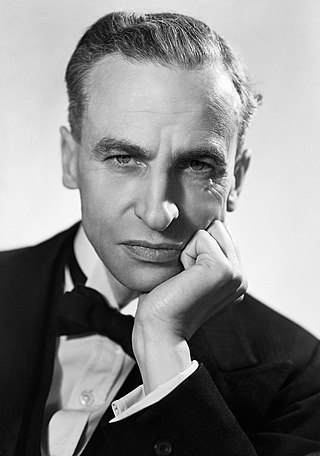
Archibald Henry Macdonald Sinclair, 1st Viscount Thurso,, known as Sir Archibald Sinclair between 1912 and 1952, and often as Archie Sinclair, was a British politician and leader of the Liberal Party.
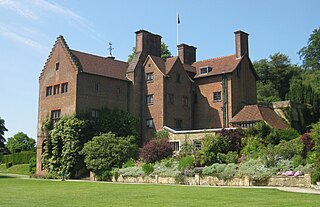
Chartwell is a country house near Westerham, Kent, in South East England. For over forty years it was the home of Sir Winston Churchill. He bought the property in September 1922 and lived there until shortly before his death in January 1965. In the 1930s, when Churchill was out of political office, Chartwell became the centre of his world. At his dining table, he gathered those who could assist his campaign against German re-armament and the British government's response of appeasement; in his study, he composed speeches and wrote books; in his garden, he built walls, constructed lakes and painted. During the Second World War, Chartwell was largely unused, the Churchills returning after he lost the 1945 election. In 1953, when again prime minister, the house became Churchill's refuge when he suffered a debilitating stroke. In October 1964, he left for the last time, dying at his London home, 28 Hyde Park Gate, on 24 January 1965.

The Shell Crisis of 1915 was a shortage of artillery shells on the front lines in the First World War that led to a political crisis in the United Kingdom. Previous military experience led to an over-reliance on shrapnel to attack infantry in the open, which was negated by the resort to trench warfare, for which high-explosive shell were better suited. At the start of the war there was a revolution in doctrine: instead of the idea that artillery was a useful support for infantry attacks, the new doctrine held that heavy guns alone would control the battlefield. Because of the stable lines on the Western Front, it was easy to build railway lines that delivered all the shells the factories could produce. The 'shell scandal' emerged in 1915 because the high rate of fire over a long period was not anticipated and the stock of shells became depleted. The inciting incident was the disastrous Battle of Aubers, which reportedly had been stymied by a lack of shells.

Sir Martin John Gilbert was a British historian and honorary Fellow of Merton College, Oxford. He was the author of 88 books, including works on Winston Churchill, the 20th century, and Jewish history including the Holocaust. He was a member of the Chilcot Inquiry into Britain's role in the Iraq War.
Sir Robert Vidal Rhodes James was a British historian and Conservative Member of Parliament. Born in India, he was educated in England and attended the University of Oxford. From 1955 to 1964, he was a clerk of the House of Commons. He meanwhile wrote a number of biographical and historical books. He then moved to academia and had been elected a Fellow of All Souls College, Oxford in 1965. He was Director of the Institute for the Study of International Organisation at the University of Sussex (1968–1973) and then Principal Officer in the Executive Office of the Secretary General of the United Nations (1973–1976). He moved from behind the scenes by being elected Member of Parliament (MP) for Cambridge in the 1976 by-election. He spent most of his parliamentary career on the backbenches, apart from serving as a Parliamentary Private Secretary at the Foreign Office (1979–1982). He was knighted in 1991 and stepped down as an MP the following year. During his time as an MP, he continued to publish multiple books and maintained his academic standing through visiting professorships and his Oxford fellowship.

George Sydenham Clarke, 1st Baron Sydenham of Combe was a British Army officer and colonial administrator.
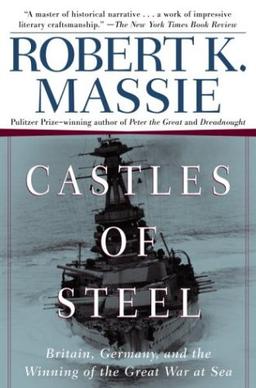
Castles of Steel: Britain, Germany, and the Winning of the Great War at Sea is a work of non-fiction by Pulitzer Prize-winner Robert K. Massie. It narrates the major naval actions of the First World War with an emphasis on those of the United Kingdom and Imperial Germany. The term "castles of steel" was coined by the British First Lord of the Admiralty Winston Churchill in reference to the large number of the Royal Navy's battleships he saw at Spithead in 1914.

The Constantinople Agreement was a secret exchange of diplomatic correspondence between members of the Triple Entente from 4 March to 10 April 1915 during World War I. France and Great Britain promised to give Constantinople and the Dardanelles, at the time part of the Ottoman Empire, to the Russian Empire in the event of victory. Britain and France put forward their own claims, to an increased sphere of influence in Persia for Britain, and to the annexation of Syria and Cilicia for France, all sides also agreeing that the governance of the Holy Places and Arabia would be under independent Muslim rule. The Greek government was neutral, but in 1915 it negotiated with the Allies, offering soldiers and especially a geographical launching point for attacks on the Turkish Straits. Greece itself wanted control of Constantinople. Russia vetoed the Greek proposal, because its own main war goal was to control the Straits, and take control of Constantinople.
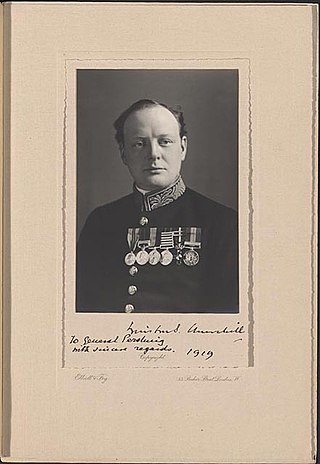
The Dardanelles Commission was an investigation into the disastrous 1915 Dardanelles Campaign. It was set up under the Special Commissions Act 1916. The final report of the commission, issued in 1919, found major problems with the planning and execution of the campaign.

The Second World War is a history of the period from the end of the First World War to July 1945, written by Winston Churchill. Churchill labelled the "moral of the work" as follows: "In War: Resolution, In Defeat: Defiance, In Victory: Magnanimity, In Peace: Goodwill". These had been the words which he had suggested for the First World War memorial for a French municipality. His suggestion had not been accepted on that occasion.
This article documents the career of Winston Churchill in Parliament from its beginning in 1900 to the start of his term as Prime Minister of the United Kingdom in World War II.
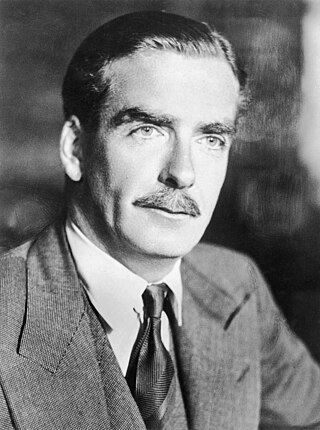
Robert Anthony Eden, 1st Earl of Avon was a British politician who served as Prime Minister of the United Kingdom and Leader of the Conservative Party from 1955 until his resignation in 1957.
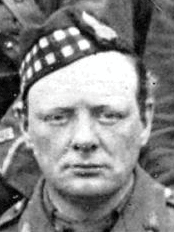
The 1917 Dundee by-election was a parliamentary by-election for the British House of Commons constituency of Dundee in the county of Angus held on 30 July 1917.

Winston Churchill was introduced to painting during a family holiday in June 1915, when his political career was at a low ebb. He continued this hobby into his old age, painting over 500 pictures of subjects such as his goldfish pond at Chartwell and the landscapes and buildings of Marrakesh. He sold some works, but he also gave away many of the works that he self-deprecatingly described as "daubs" as gifts.

Winston Churchill was first elected to the UK Parliament at the 1900 general election as one of two Conservative Party members representing the Oldham constituency. He took his seat in the House of Commons in February 1901 but soon became critical of the Conservative government on a number of issues. On 31 May 1904, he formally crossed the floor of the Commons to join the opposition Liberals, remaining a party member until March 1924.
Winston Churchill retained his UK Parliamentary seat at the 1929 general election as member for Epping, but the Conservative Party was defeated and, with Ramsay MacDonald forming his second Labour government, Churchill was out of office and would remain so until the beginning of the Second World War in September 1939. This period of his life has been dubbed his "wilderness years", but he was extremely active politically as the main opponent of the government's policy of appeasement in the face of increasing German, Italian and Japanese militarism.

Sir Eric Arthur Seal was a British civil servant who served as Principal Private Secretary to the Prime Minister, Winston Churchill, during World War II; and as Principal Private Secretary to Winston Churchill in his role as First Lord of the Admiralty in 1939. These two positions are public, rather than private posts. He was chairman of the UK Civil Service for seventeen years.

The Bibliography of Winston Churchill includes the major scholarly and nonfiction books and scholarly articles on the career of Winston Churchill, as well as other online sources of information.


















